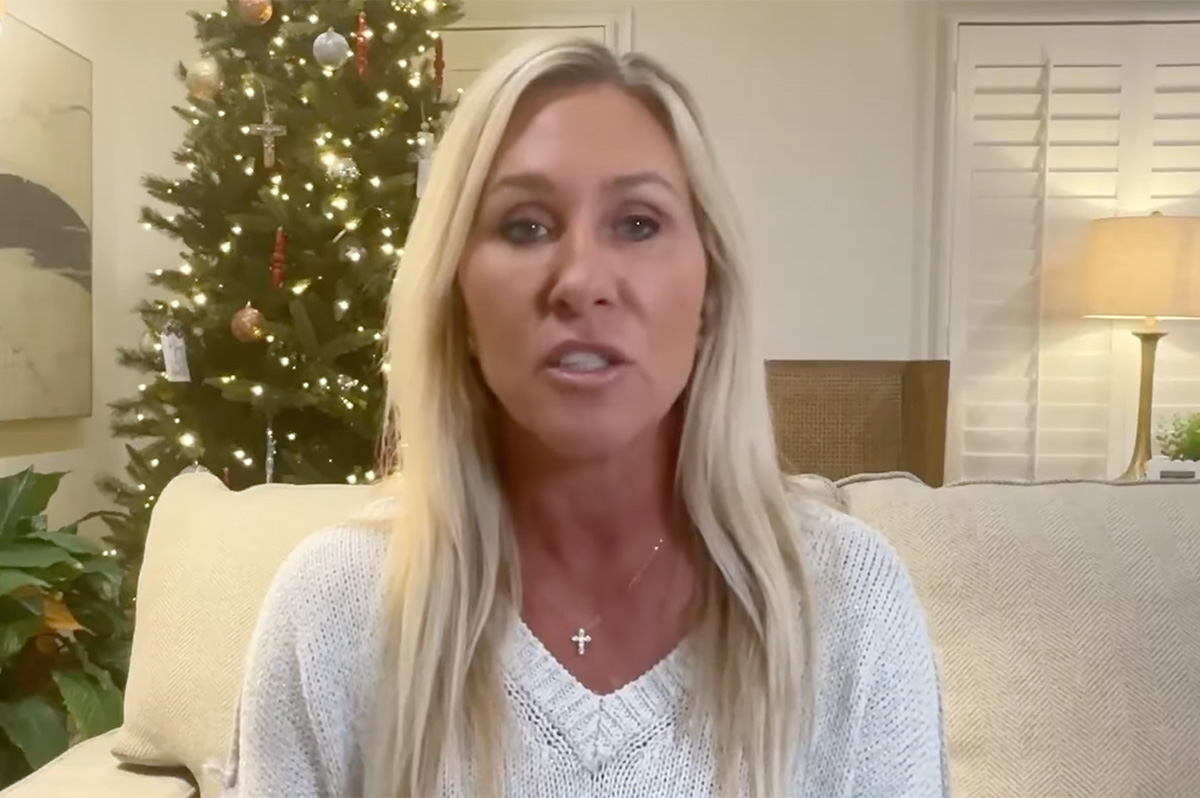Politics
Gay Iowa man denied relief under HIV-criminalization law
Court rules Rhoades could have infected partner through unprotected oral sex

The Iowa Court of Appeals ruled that a gay Iowa man was at risk of infecting his partner through unprotected oral sex. (image via wikimedia).
A gay HIV-positive man in Iowa was unable Wednesday to obtain relief from his conviction under a state HIV criminalization law because he received unprotected oral sex while withholding his HIV status.
In a 3-0 ruling, the Iowa Court of Appeals ruled Nick Rhoades is ineligible for post-conviction relief because he may have transmitted HIV to his sexual partner in 2008 through oral sex. Judge Richard Doyle wrote the opinion.
“Sexual intercourse may be committed through oral sex, and oral sex is a well-recongized means of transmission of HIV,” Doyle writes. “The person exposed to HIV need not become infected with the virus in order for the infected person to be prosecuted under section 709C.1(4).”
In 2008, Rhoades had a one-night-stand with Adam Plendi. After meeting online at Gay.com, Rhoades went to Plendi’s home in Cedar Falls and the two had consensual sex. Rhoades received unprotected oral sex, and then the two had protected anal sex in which Plendi was the receptive partner. Rhoades is HIV-positive, but didn’t disclose that information to Plendi, who wasn’t infected by the encounter.
After later learning that Rhoades is HIV-positive, Plendi contacted the police, who charged Rhoades with criminal transmission of HIV. Under advice from his attorney, Rhoades pled guilty to the charges and was given the maximum sentence of 25 years in prison and classified as a sex offender. Several months later the court reconsidered the decision, suspended Rhoades’ prison sentence and placed him on supervised probation for five years.
In March 2010, Lambda Legal on behalf of Rhoades applied for post-conviction relief, arguing his attorney who advised him to plead guilty had failed to inform him of the specifics of the statute. Rhoades contended he didn’t violate the law because the anal sex was protected and during oral sex he didn’t intend to ejaculate.
In December 2011, the district court denied the application. The court of appeals decision on Wednesday affirmed that denial.
“[T]hat Rhoades may not have ejaculated during the unprotected oral sex is irrelevant,” the decision states. “Here, the minutes of testimony unequivocally establish Rhoades engaged in unprotected oral sex with A.P., and consequently, Rhoades’s claim that he did not ejaculate provides no support to his argument there was a lack of a factual basis regarding the ‘intent element’ of ‘intimate contact.’ We therefore conclude a factual basis existed to support Rhoades’s plea of guilty.”
The general consensus of research indicates while HIV infection through unprotected oral sex is possible, it’s extremely unlikely. According to the website for the Minnesota AIDS Project, the risk of HIV transmission is very low because the mouth is an unfriendly environment for HIV.
“Saliva contains enzymes that break down the virus and the mucous membranes in the mouth are more protective than anal or vaginal tissue,” the website states. “There are a few documented cases where it appears that HIV was transmitted orally and those cases are attributed to ejaculation into the mouth.”
The website for the Centers for Disease Control says “it is possible” to infect someone with HIV through performing or receiving oral sex and there have been a few reported cases of transmission, but it’s a less common mode of transmission than anal and vaginal sex.
Christopher Clark, Lambda’s senior staff attorney, said his organization is “extremely disappointed” because the conviction is the result of “a misinterpretation of the plain language of the statute.”
“Someone who engages in safe sex, as Nick did, does not have the intent required to support a conviction under Iowa’s law concerning the criminal transmission of HIV,” Clark said.
Clark said Lambda is reviewing possible options with Rhoades in the aftermath of the ruling, which includes a potential appeal to the Iowa Supreme Court.
According to Lambda, 39 states have HIV-specific criminal statutes or have brought HIV-related criminal charges, resulting in more than 160 prosecutions in the United States in the past four years. The laws have been criticized for creating a disincentive for HIV testing and potentially discouraging the disclosure of HIV status.
Scott Schoettes, HIV Project Director for Lambda Legal, said the court decision demonstrates the harm of HIV-criminalization laws.
“This decision is another example of how our outdated perceptions of and misunderstandings about HIV are still driving public policy, leading to horrifying criminal penalties for the person living with HIV, even in situations where no harm was intended or actually occurred,” Schoettes said.
Sean Strub, a native Iowan and founder of POZ Magazine, said the court decision is based on “misconceptions” over HIV transmission.
“There’s never been a documented, proven case where HIV was transmitted through anal sex from someone known to have an undectable viral load, let alone oral sex as was under consideration in this ruling,” Strub said. “It hasn’t even been established for certain that HIV is ever transmitted through oral sex, even when a person has a detectable viral load, except when there are open sores or other extreme circumstances.”
Legislation is pending before the Iowa Legislature that would modify the state’s HIV criminalization law. It passed the Iowa State Senate Judiciary Committee last year by an 11- 2 vote with bi-partisan support. Strub said he’s hopeful in this next legislative session the bill will pass and be signed into law by Gov. Terry Branstad.
Congress
MTG resigns after years of anti-LGBTQ attacks amid Trump feud
Greene’s abrupt departure adds fresh uncertainty to an already fractured Republican Party.

Rep. Marjorie Taylor Greene announced on Friday that she is resigning from Congress.
In a post on X (formerly Twitter), the Georgia 14th Congressional District representative announced her sudden decision to resign from office.
The nearly 11-minute-long video shows Rep. Greene stating she will step down from her role representing one of Georgia’s most Republican districts on Jan. 5, 2026. She cited multiple reasons for this decision, most notably her very public separation from Trump.
In recent weeks, Greene — long one of the loudest and most supportive MAGA members of Congress — has butted heads with the president on a slew of topics. Most recently, she supported pushing the DOJ to release the Epstein Files, becoming one of only four Republicans to sign a discharge petition, against Trump’s wishes.
She also publicly criticized her own party during the government shutdown. Rep. Greene had oddly been supportive of Democratic initiatives to protect healthcare tax credits and subsidies that were largely cut out of national healthcare policy as a result of Trump’s “Big Beautiful Bill,” passed in July.
“What I am upset over is my party has no solution,” Greene said in October.
Trump recently said he would endorse a challenger against the congresswoman if she ran for reelection next year, and last week went as far as to declare, “Marjorie ‘Traitor’ Green is a disgrace to our GREAT REPUBLICAN PARTY!” on his Truth Social platform.
Trump told ABC News on Friday night that Greene’s resignation is “great news for the country,” and added that he has no plans to speak with Greene but wishes her well.
Despite her recent split with the head of the Republican Party, Rep. Greene has consistently taken a staunch stance against legislation supporting the LGBTQ community — notably a hardline “no” on any issue involving transgender people or their right to gender-affirming care.
Rep. Greene has long been at odds with the LGBTQ community. Within her first month in office, she criticized Democrats’ attempts to pass the Equality Act, legislation that would bar anti-LGBTQ employment discrimination. She went as far as to suggest an apocalypse-like scenario if Congress passed such a measure.
“God created us male and female,” she said on the House floor. “In his image, he created us. The Equality Act that we are to vote on this week destroys God’s creation. It also completely annihilates women’s rights and religious freedoms. It can be handled completely differently to stop discrimination without destroying women’s rights, little girls’ rights in sports, and religious freedom, violating everything we hold dear in God’s creation.”
Greene, who serves one of the nation’s most deeply red districts in northwest Georgia, attempted to pass legislation dubbed the “Protect Children’s Innocence Act,” which would have criminalized gender-affirming care for minors and restricted federal funding and education related to gender-affirming care in 2023. The bill was considered dead in January 2025 after being referred to the House Committee on the Judiciary.
Her push came despite multiple professional medical organizations, including the nation’s largest and most influential — the American Medical Association — stating that withholding gender-affirming care would do more harm than any such care would.
She has called drag performers “child predators” and described the Democratic Party as “the party of killing babies, grooming and transitioning children, and pro-pedophile politics.”
Greene has also publicly attacked Delaware Rep. Sarah McBride, the nation’s first and only transgender member of Congress. She has repeatedly misgendered and attacked McBride, saying, “He’s a man. He’s a biological male,” adding, “he’s got plenty of places he can go” when asked about bathrooms and locker rooms McBride should use. Greene has also been vocal about her support for a bathroom-usage bill targeting McBride and transgender Americans as a whole.
She has repeatedly cited false claims that transgender people are more violent than their cisgender counterparts, including falsely stating that the 2022 Robb Elementary School shooter in Texas was transgender.
The former MAGA first lady also called for an end to Pride month celebrations. She criticized the fact that the LGBTQ community gets “an entire” month while veterans get “only one day each year” in an X post, despite November being designated as National Veterans and Military Families Month.
Under Georgia law, Gov. Brian Kemp (R) must hold a special election within 40 days of the seat becoming vacant.
The Washington Blade reached out to both the White House and Greene’s office for comment, but has not heard back.

PFLAG honored U.S. Rep. Maxine Waters (D-Calif.) with the “2025 PFLAG National Champion of Justice” award during their annual “Love Takes Justice” event in Washington.
Waters has represented California’s 43rd Congressional District — including much of Los Angeles — since 1991 and has been a vocal advocate for LGBTQ rights since her swearing-in.
Her track record includes opposing the Defense of Marriage Act, which would have made marriage only between a man and a woman; co-sponsoring the Respect for Marriage Act, ultimately requiring all U.S. states to recognize same-sex marriages performed by other states; and is a long time supporter of the Equality Act, which would codify comprehensive protections for LGBTQ Americans.
In addition to her work on marriage equality, she also created the Minority AIDS Initiative to help address the devastating impact of HIV/AIDS on minority communities, particularly communities of color.
The award reception took place Tuesday at the headquarters of the American Federation of Teachers, where Waters was presented with the award by former U.S. Rep. Barney Frank (D-Mass.), the openly gay member of Congress. Frank praised Waters for her unwavering support for the LGBTQ community and her lifelong commitment to advancing equality for all.
“One of the most encouraging developments in the fight for human rights is the failure of those who traffic in any form of bigotry, including bigotry to divide the Black and LGBTQ+ communities,” said Frank, who came out in 1987 while in office. “No one deserves more recognition for strengthening our unity than Maxine Waters.”
During the reception, Waters spoke about her extensive history of LGBTQ advocacy within the halls of Congress, emphasizing that her idea of government centers around uplifting its most vulnerable and threatened communities.
“From the very beginning of my public life I’ve believed that the government must protect those that are vulnerable, including LGBTQ+ people, who have been pushed to the margins, criminalized and told that their lives and their love do not matter,” Waters said. “Discrimination has no place in our laws.”
She continued, adding that the discrimination LGBTQ people have dealt with — and continue to deal with — is unconstitutional and wrong.
“I am proud to stand with LGBTQ+ families against efforts to write discrimination into our constitution, against attempts to deny people jobs, housing, healthcare and basic dignity because of who they are or who they love,” she said.
Waters joins a slew of other LGBTQ advocates who have received this award, beginning with the late-Georgia Congressman John Lewis in 2018. Past honorees include Oakland (Calif.) Mayor Barbara Lee, who was then a member of Congress, U.S. Sen. Tammy Baldwin (D-Wis.), Frank, Colorado Gov. Jared Polis, who was then a member of Congress, and Speaker Emerita Nancy Pelosi (D-Calif.).
PFLAG CEO Brian Bond commented on the continued fight for LGBTQ rights in the U.S. as anti-transgender rhetoric and policies coming from the Trump-Vance White House grow each week.
“LGBTQ+ people and their families — and all of you here — know too well the reality of the political climate, the attitudes of the public, and the sheer lack of respect that LGBTQ+ people are experiencing in the world today. There’s no end to the hostile barrage of harmful laws, city ordinances, and regulations, especially against our trans loved ones,” Bond said. “This particular moment in history calls us to increase and fortify our work, advocating at every level of government.”
He ended with some hope — reminding the LGBTQ community they have been on the receiving end of discrimination and unjust treatment before, but have risen above and changed the laws — saying we can do it again.
“PFLAG members and supporters are uniquely suited for this moment, because we are fighting for and alongside our LGBTQ+ loved ones, we know that our love is louder … and love and liberty are inseparable,” said Bond.
Congress
Global Respect Act reintroduced in US House
Measure would sanction foreign officials responsible for anti-LGBTQ human rights abuses

U.S. Reps. Sarah McBride (D-Del.) and Brian Fitzpatrick (R-Pa.) on Thursday reintroduced a bill that would sanction foreign officials who carry out anti-LGBTQ human rights abuses.
A press release notes the Global Respect Act would direct “the U.S. government to identify and sanction foreign persons who are responsible for torture, arbitrary detention, physical attacks, murder, and other flagrant abuses against LGBTQI+ individuals.” The measure would also require “annual human rights reporting from the State Department and strengthens coordination with foreign governments, civil society, and the private sector to prevent anti-LGBTQI+ persecution.”
“Freedom and dignity should never depend on your zip code or who holds power in your country,” said McBride.
The Delaware Democrat who is the first openly transgender person elected to Congress notes consensual same-sex sexual relations remain criminalized in more than 60 countries, while “far too many (countries) look away from the violence that follows.”
“The Global Respect Act reaffirms a simple truth: no one should be targeted for who they are or whom they love,” said McBride. “This bill strengthens America’s voice on human rights.”
“No person should ever face imprisonment, violence, or discrimination on the basis of who they are,” added Fitzpatrick. “The Global Respect Act imposes real and necessary sanctions on those who carry out these abuses and strengthens America’s resolve to uphold basic human rights worldwide.”
The Global Respect Act has 119 co-sponsors. McBride and Fitzpatrick reintroduced it in the U.S. House of Representatives on the annual Transgender Day of Remembrance.
“As we mark Transgender Day of Remembrance, we reaffirm that no one, no matter where they live in the world, should be persecuted or subjected to violence simply because of who they are or whom they love,” said Mark Bromley, co-chair of the Council for Global Equality. “The Global Respect Act seeks to hold the world’s worst perpetrators of violence against LGBTQI+ people accountable by leveraging our sanctions regimes to uphold the human rights of all people.”
Outright International, Amnesty International USA, Robert F. Kennedy Human Rights, ORAM (Organization for Refuge, Asylum and Migration), and the Human Rights Campaign are among the other groups that have endorsed the bill.
U.S. Sens. Jeanne Shaheen (D-N.H.) and Lisa Murkowski (R-Alaska) in June introduced the Global Equality Act in the U.S. Senate. Gay California Congressman Robert Garcia and U.S. Sen. Edward Markey (D-Mass.) on Monday introduced the International Human Defense Act that would require the State Department to promote LGBTQ and intersex rights abroad.
The promotion of LGBTQ and intersex rights was a cornerstone of the Biden-Harris administration’s overall foreign policy.
The global LGBTQ and intersex rights movement since the Trump-Vance administration froze nearly all U.S. foreign aid has lost more than an estimated $50 million in funding.
The U.S. Agency for International Development, which funded dozens of advocacy groups around the world, officially shut down on July 1. Secretary of State Marco Rubio earlier this year said the State Department would administer the remaining 17 percent of USAID contracts that had not been cancelled.
-

 India5 days ago
India5 days agoIndia’s Jharkhand state works to improve trans people’s access to health care
-

 Commentary5 days ago
Commentary5 days agoPerfection is a lie and vulnerability is the new strength
-

 District of Columbia3 days ago
District of Columbia3 days agoHIV/AIDS activists block intersection near White House
-

 Movies4 days ago
Movies4 days agoHoliday movie season off to a ‘Wicked’ good start


















